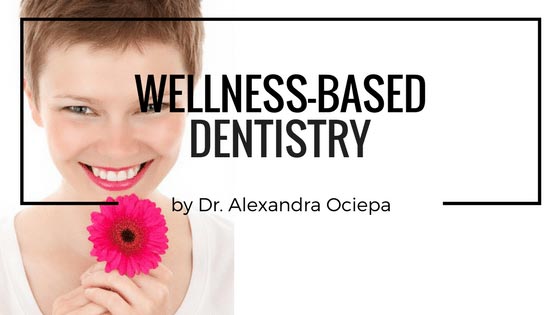A Wellness-Based Approach to Oral Health

April is National Oral Health Month! We all know to brush and floss our teeth, as well as regular dental checkups and cleanings, are important to keep our teeth cavity-free and eliminate bad breath. Very few of us know how the health of our mouth in London is linked with the rest of our bodies.
5 Ways Oral Health is Important to our Overall Health:
1. Our Mouth is the Gateway to our Entire Body
Many of us take for granted that our mouth is not connected to the rest of our body. In reality, what happens in our mouth can indicate our whole body health. If you see blood in your sink when you are brushing your teeth, you have an open door between your mouth and the rest of your body via your bloodstream. The harmful bacteria that cause gum disease can then travel to other parts of your body through these open doors and potentially cause serious whole-body health problems.
2. Healthy Gums Mean a Healthier Heart
There is evidence that suggests a link between gum disease and heart health. The Canadian Academy of Periodontology states, “people with gum disease have twice the risk of having a fatal heart attack than people without gum disease”[1]. According to the American Academy of Periodontology, “people diagnosed with a stroke were found more likely to have an oral infection when compared to those in the control group”[2]. This link between gum disease and heart health seems to be related because gum disease is an inflammatory disease and the inflammation could be responsible for this link.
3. Oral Health & Diabetes: The Double-Edged Sword
The relationship between oral health and diabetes is two-fold. First, research has shown this link between gum disease and diabetes goes both ways. The American Academy of Periodontology reports “diabetic patients are more likely to develop gum disease, which in turn can increase blood sugar and diabetic complications”[3]. Second, most diabetics need more frequent dental visits to keep their gum disease stabilized because of the ancillary effects of their diabetes.
4. Fertility & Pregnancy Affected by Oral Health
Gum disease has been shown to be a risk factor for decreased fertility as well as an increase in premature births. According to the Canadian Academy of Periodontology, “mothers with gum disease may be at a 7 times greater risk for having a premature or low birthweight baby”[4]. In addition, a study out of the University of Western Australia was the first study to show the link between gum disease and a women’s chance of getting pregnant. They found “that women with gum disease took on average two months longer to conceive than women without gum disease”[5]. It is important for any pregnant women or women trying to become pregnant to make sure they are brushing, flossing and seeing their dentist regularly.
5. Possible Link between Gum Disease & Alzheimer’s Disease
There may be a link between Alzheimer’s disease and gum disease. A joint study by the University of Southampton and King’s College London concluded that “gum disease is associated with an increase in cognitive decline in Alzheimer’s Disease, possibly via mechanisms linked to the body’s inflammatory response”[6]. This study suggests treatment and maintenance of gum disease may help those with Alzheimer’s Disease.
Oral Health with a Wellness-Based Approach:
Now we know why oral health is so important to overall whole body health and optimal well-being for you and your entire family! Since our mouth is the gateway to our entire body then it is only appropriate to consider our entire body when addressing our oral health.
This is where oral health with a wellness-based approach comes in! This approach is an integrative approach that focuses on patient-centered care from both a conventional and “alternative” healthcare point of view. It means looking at the relationship between your entire body and your oral health, not just your teeth!
Here are some Oral Health Options that are available:
1. Dietary Recommendations
What we eat and drink plays an important role not only in overall health but in the health of your teeth and gums. We all know sugar can play havoc on our bodies as well as cause cavities. What most people don’t know is that it’s not just the sugar in candy that increases the likelihood of cavities, it’s all sugar and carbohydrates, healthy or unhealthy! In addition, in order to get a cavity, the pH in your mouth has to be acidic. So if you’re eating or drinking lots of sugary acidic items, your teeth just have no chance to use the minerals in your saliva to remineralize, and when your teeth are able to remineralize (through an alkaline oral state) your saliva can act as a defense or barrier to the invading acid and sugar.
2. Prevention is Key!
Brushing, flossing, and regular dental visits are key! Few of us enjoy going to the dentist. However, regular checkups and cleanings help prevent future problems by spotting concerns when they are small as well as preventing possible future problems.
3. Topical Fluoride vs. Non-Fluoride Cavity Protection
Fluoride has been used to help prevent cavities. Topical fluoride is available in toothpaste, rinses, and in-office dental treatments. According to the Canadian Dental Association, “fluoride has a positive effect on oral health by making teeth more resistant to decay. Fluoride can also prevent or even reverse tooth decay that has started“[7]. Some people have concerns with fluoride, and as a result, there are both fluoride and non-fluoride in-office cavity protection treatments available.
4. BPA vs. Non-BPA White Fillings
There are a variety of materials available to be used as restorations when cavities or broken teeth arise. These include composite resin (white filling material), gold, porcelain, and silver amalgam. Some people are concerned about Bisphenol A (BPA) in white filling materials. According to the Canadian Dental Association, “no restrictions are planned for dental materials because they are well within safety margins”[8]. If you are concerned about BPA, there are options without BPA, like porcelain and some white filling material made with all-ceramic-based technology.
5. Extra Precautions when Removing Silver Amalgam Fillings
According to the U.S. Food & Drug Administration (FDA), “dental amalgam [silver fillings] is a mixture of metals, consisting of liquid (elemental) mercury and a powdered alloy composed of silver, tin, and copper. Approximately 50% of dental amalgam is elemental mercury by weight”[9]. The International Academy of Oral Medicine & Toxicology reports “the process of drilling out amalgam fillings liberates quantities of mercury vapor and fine particulates that can be inhaled and absorbed through the lungs and this is potentially harmful to patients, dentists, dental workers and their fetuses”[10]. As a result, extra precautions can be taken to reduce the occupational exposure to mercury if you need any of your silver amalgam fillings removed.
6. No-Needle’s for Kids
If your kids have cavities that need to be addressed, there is an option to use a laser to numb up their baby teeth without using a traditional needle. Wouldn’t it be great if it only worked on adult teeth?!
Dentistry is about options. It is up to your dentist to provide those options with the pros and cons associated with them and for you to ultimately decide which options are best for you and your family.
If you would like more information about your whole body oral health, please contact Dr. Alexandra Ociepa at Mint Leaf Dental - dralex@mintleafdental.ca or 519-860-6468 or mintleafdental.ca.
[1] http://www.cap-acp.ca/en/public/perio_health.html
[2] https://www.perio.org/consumer/heart_disease
[3] https://www.perio.org/consumer/diabetes.htm
[4] http://www.cap-acp.ca/en/public/perio_health.html
[5] http://www.medicalnewstoday.com/articles/230568.php
[6]https://www.sciencedaily.com/releases/2016/03/160310141330.htm
[7] https://www.cda-adc.ca/en/oral_health/faqs/fluoride_faqs.asp
[8] https://www.cda-adc.ca/en/oral_health/faqs/bpa_faqs.asp
[9]https://www.fda.gov/MedicalDevices/ProductsandMedicalProcedures/DentalProducts/DentalAmalgam/ucm171094.htm
[10] https://iaomt.org/for-patients/safe-amalgam-removal/
CONVENIENT
OFFICE HOURS
Give us a call and let's find out how we can make your time in our office as convenient for you as possible.
Monday
7:30am - 11:00am
3:00pm - 6:00pm
Tuesday
3:00pm - 6:00pm
Wednesday
7:30am - 11:00am
3:00pm - 6:00pm
Thursday
3:00pm - 6:00pm
Friday
7:30am - 11:00am
Saturday
Closed
LifeHouse Chiropractic
520 Springbank Drive #4
London, ON N6J 1G8
Phone (519) 204-9460
Fax (519) 601-9461




